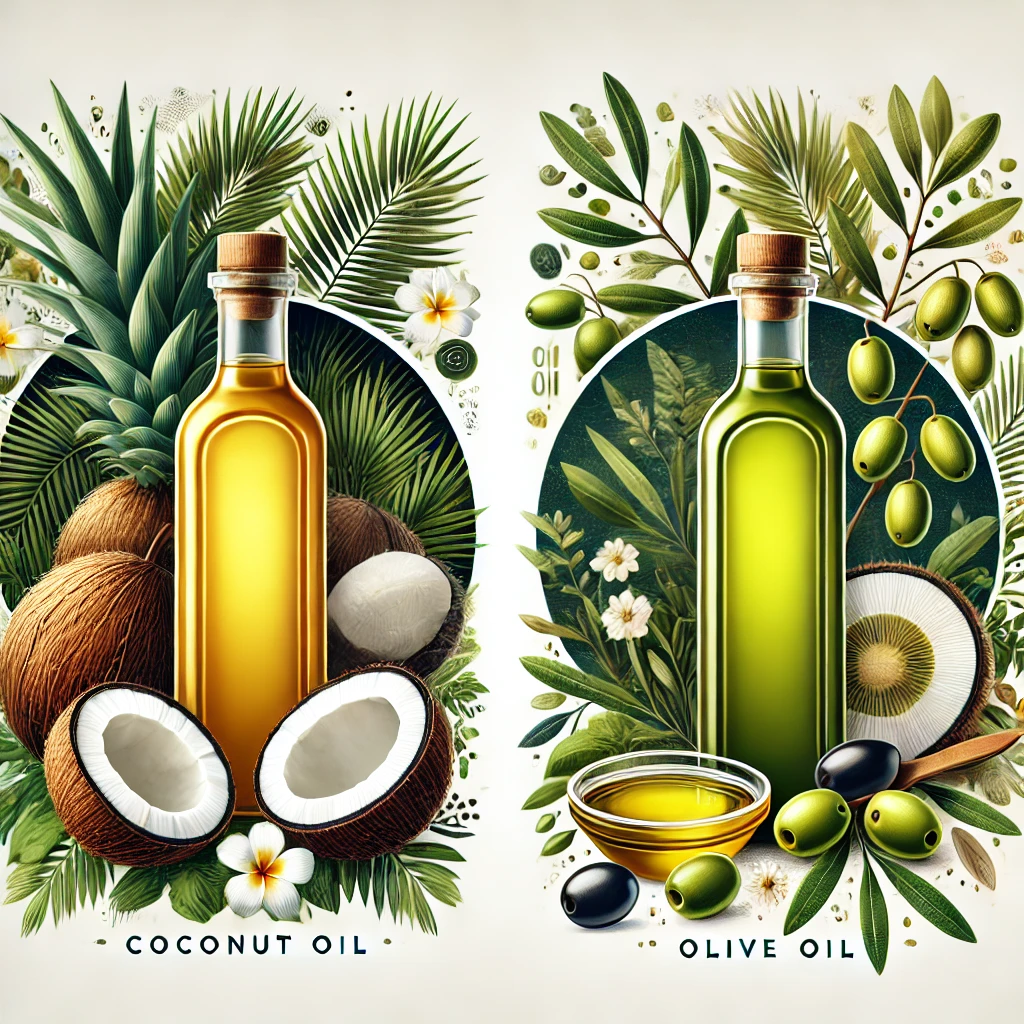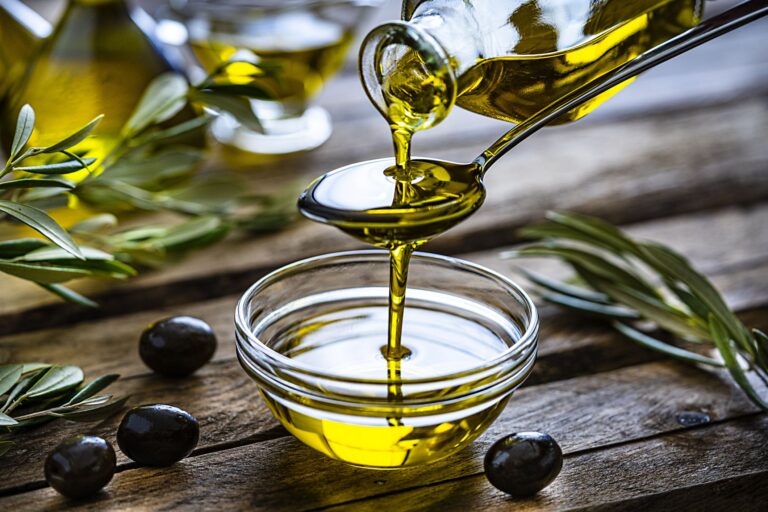
A Tale of Two Kitchens
Picture this: a warm kitchen in Kerala, where the aroma of coconut oil fills the air as a family prepares crispy banana chips. Thousands of miles away in a quaint Italian home, a grandmother lovingly drizzles olive oil over a fresh salad, recounting stories of its role in promoting long, healthy lives.
Both oils have become staples in households worldwide, celebrated not only for their unique flavors but also for their health benefits. But which is better for your daily use—coconut oil or olive oil? Let’s dive deep into the health benefits of edible oils, their environmental impact, and their role in today’s market.
Health Benefits of Edible Oil: Coconut Oil
Coconut oil has gained immense popularity, especially in health and fitness communities. It’s packed with medium-chain triglycerides (MCTs), a type of fat that the body can easily convert into energy. This makes coconut oil a favorite for those following keto or low-carb diets.
Nutritional Profile
Coconut oil is rich in saturated fats (~90%), particularly MCTs, which:
- Boost metabolism and help in weight management.
- Support brain health, with studies suggesting they may improve cognitive function in conditions like Alzheimer’s.
- Promote healthy skin and hair, as coconut oil acts as a natural moisturizer.
In regions like South Asia, where coconut oil is among the most consumed edible oils, it’s a staple not only in cooking but also in traditional beauty routines.
Health Benefits of Edible Oil: Olive Oil
Olive oil, especially extra virgin olive oil (EVOO), is celebrated for its heart-healthy properties. It’s a cornerstone of the Mediterranean diet, which is often linked to increased life expectancy and lower rates of chronic illnesses.
Nutritional Profile
Olive oil contains high levels of monounsaturated fats (~70%) and antioxidants, which:
- Lower bad cholesterol (LDL) while boosting good cholesterol (HDL), reducing heart disease risks.
- Combat inflammation, thanks to its rich polyphenol content.
- Protect against oxidative stress, a factor in aging and chronic disease.
While coconut oil is popular in tropical cuisines, olive oil is a favorite in Mediterranean dishes, where its fruity, peppery flavor enhances salads, pastas, and roasted vegetables
Comparing Two Popular Types of Edible Oil
When it comes to choosing between coconut oil and olive oil, understanding their key differences can help:
Cooking Versatility
- Coconut Oil: With a high smoke point, it’s ideal for frying, baking, and sautéing.
- Olive Oil: Better suited for low-heat cooking, salad dressings, or drizzling over finished dishes to retain its antioxidants.
Taste and Aroma
- Coconut Oil: Sweet and nutty, making it perfect for tropical dishes and desserts.
- Olive Oil: Fruity with a slight bitterness, a signature flavor in Mediterranean cuisine.
Health Impact
While coconut oil boosts energy and metabolism, olive oil stands out for its cardio-protective properties. Both oils offer unique benefits, depending on your dietary goals.
The Environmental Impact of Oil Production
Coconut Oil
Coconut oil is relatively sustainable compared to other oils, like palm oil, which is linked to deforestation. Coconut trees require minimal water and are pesticide-free, making coconut oil an environmentally friendly choice.
However, the growing global demand for coconut oil has raised concerns about fair labor practices in some regions. Opting for ethically sourced coconut oil can help address this issue.
Olive Oil
Olive oil production supports biodiversity in Mediterranean regions but comes with its challenges. Large-scale farming can lead to soil erosion and water overuse. Sustainable practices, such as organic farming, are essential to reduce its ecological footprint.
The Price Rise of Edible Oil
The global price rise of edible oils has affected both coconut and olive oil. Factors like climate change, supply chain disruptions, and increasing demand for healthier options have driven prices higher.
- Coconut Oil: Still relatively affordable in tropical regions, where it’s locally produced.
- Olive Oil: Often more expensive, especially extra virgin varieties, but many consumers find its health benefits worth the investment.
Understanding these price trends helps consumers make informed choices based on their budget and priorities.
Edible Oil Refining and Its Impact
Refining processes can significantly affect the nutritional value of edible oils. Heavily refined oils lose many of their natural benefits, making it crucial to choose minimally processed options.
- Cold-Pressed or Virgin Coconut Oil retains its natural MCTs, offering maximum health benefits.
- Extra Virgin Olive Oil is free from chemical refining, preserving its antioxidants and polyphenols.
Choosing unrefined oils ensures that you’re getting the best quality for your health.
Real Stories: Coconut Oil and Olive Oil in Action
Coconut Oil: A Multifunctional Marvel
Priya, a yoga instructor, incorporates coconut oil into her daily life. “I use it for everything—cooking, moisturizing, and even oil pulling. It’s a versatile oil that makes me feel energized and balanced,” she shares.
Olive Oil: A Mediterranean Must-Have
Luca, a chef from Italy, says, “Olive oil isn’t just an ingredient; it’s a tradition. From drizzling it over pasta to making salad dressings, it adds depth and heart to my dishes.”
These real-life testimonials highlight how both oils cater to different lifestyles and culinary needs.
Conclusion: Coconut Oil or Olive Oil—Which One Should You Choose?
Both coconut oil and olive oil are nutritional powerhouses with distinct advantages. Coconut oil shines in high-heat cooking, boosting metabolism, and doubling as a beauty product. Olive oil, on the other hand, is a heart-healthy choice, perfect for lighter, Mediterranean-inspired meals.
Ultimately, your choice depends on your personal preferences, dietary needs, and environmental priorities. So, which oil will you add to your kitchen to enhance your health and cooking?



